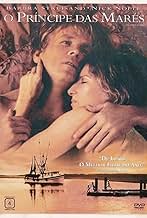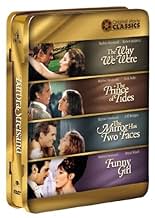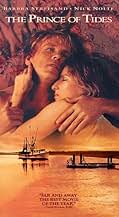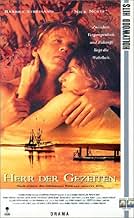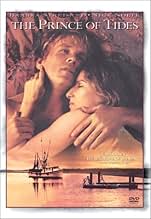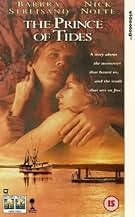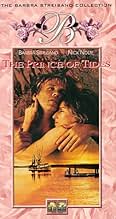Un hombre desequilibrado habla con el psiquiatra de su hermana suicida sobre la historia familiar y en el transcurso se enamora de ella.Un hombre desequilibrado habla con el psiquiatra de su hermana suicida sobre la historia familiar y en el transcurso se enamora de ella.Un hombre desequilibrado habla con el psiquiatra de su hermana suicida sobre la historia familiar y en el transcurso se enamora de ella.
- Dirección
- Guionistas
- Elenco
- Nominado a 7 premios Óscar
- 3 premios ganados y 18 nominaciones en total
- Savannah Wingo (age 10)
- (as Nancy Atchison)
Opiniones destacadas
First of all there's always the problem what one wants; to read the book or watch the film but since I then didn't own the book I had to see the film and indeed it made a huge impression on my. The cinematography and casting is superb and now after having read the book I realize that although a lot is left out in the film it wouldn't have been possible to include all the details of the book in the film.
Although it's a typical "Hollywood" film it has a deep sense of beaty and tragedy and I do believe that the film includes the most essential parts of the book in its own right. Of course we don't for instance hear a bit about the great grandmother and her life, nor her biblical husbond and certain parts of the book are changed in the film.
However it's a film that makes sense; tragedy, love and the southern way mixed in a very particular way and that especially is what, from my point of view, makes the film great. It's not just a funny or boring one, it really has something to tell all of us.
I do also feel that it shows the southern way of life in a very true manner although it can be strange compared to other places in the US we really here get to see what the southern parts of US is all about.
Barbra Streisand also in this film, as in all other ones where she appaears, is great; that lady really has talent and she knows it! Being a fabolous singer and a fabolus actress at the same time is quite somethng so again...bravo Barbra you're one of the absolutely best actresses.
Streisand graciously hands the spotlight over to actor Nick Nolte, who gives the most sensitive, emotionally complex performance of his varied career. Tom Wingo is a walking shell of a man who quells his pain with a drink, an easy smile, a cleverly foul remark, and a bitter, uncontrollable outpouring of anger. A one-time Southern-bred football coach-turned-teacher, he has grown increasingly irresponsible and disconnected over the years. With a troubled marriage hovering over him, he conveniently heads off to New York City at the urging of sister Savannah's psychiatrist, Susan Lowenstein, following his twin's most recent wrist-slashing attempt. His purpose is to fill in the missing details of her tormented past (she has blotted out all childhood memories) in order to help steer the psychiatrist in her recovery process. Eventually, Tom, who lacks faith in psychiatry, finds himself facing his own demons as these initial discussions about Savannah take a suddenly dramatic and romantic turn.
In addition to Nolte's Oscar-nominated showcase, much of the film's strength lies in the highly concentrated flashback sequences as Tom recalls his turbulent family life. Kate Nelligan (also Oscar-nominated) is simply extraordinary as Lila, Tom's brittle, often callous mother, who quite understandably vows to remarry into money after surviving a horrific first marriage to Tom's violent, alcoholic, dirt-poor father (played by an absolutely terrifying Brad Sullivan). Nelligan grabs this role literally by the throat and allows her character no apologies for her flawed, self-serving logic, despite the effects it would have on her children, as her wealthy second husband starts exhibiting the same abusive traits as the first. Kudos must also go to the three strong young actors who play the Wingo siblings as children for reenacting the more horrific elements of this story.
Some of the other present-day roles, however, are hit-and-miss in their effectiveness. Blythe Danner has some strained though affecting moments as Tom's neglected wife. Sadly, the vital role of Savannah is nearly excised from the film. What with the talented Melinda Dillon egregiously reduced to such an insignificant extra, one can only rue the dramatic potential untapped here. As Savannah's neighbor and trusted friend, George Carlin seems to be around merely to show off New York gay chic -- providing mild amusement, a bit of pathos, and little else. On a brighter note, Jason Gould (Barbra's real-life son) acquits himself surprisingly well in the difficult role of Lowenstein's antagonistic son who slowly bonds with Tom's absentee father figure -- showing for once that nepotism isn't necessarily blind or reckless. Dutch actor Jeroen Krabbé gets brief but noticeable exposure as Herbert Woodruff, Lowenstein's charming, smug-elegant husband, a renown concert violinist who demonstrates more affection for his Stradivarius than either his wife or child. There is one telling dinner scene at his opulent Manhattan high-rise in which the out-classed Wingo gets to put Woodruff in his place.
As for Streisand herself, many will invariably take her to task for casting herself in the fundamental role of Susan Lowenstein. A star of such magnitude always faces the daunting task of presenting a fully- realized character, and Streisand is only marginally successful here. Although there is undeniable sexual chemistry between her and Nolte, it's hard to overlook her somewhat glossy approach to the role and the unethical intentions of her character. One can only imagine the ramifications of such a harmful act had her suicidal patient ever uncovered the illicit affair between her brother and psychiatrist.
Director Streisand, however, must be applauded for her explicit attention to exterior details. A visually resplendent picture, great care was taken to get the right look and feel. Notice particularly the lovely allegorical scenes with the children at the beginning and end. And with Streisand's exceptional musicianship, it is hardly surprising that James Newton Howard's lush score is one of the most beautifully designed ever (in fact, I borrowed it for my own commitment ceremony in 1996). It floods the film with an unexpressible tenderness. Nick Nolte's bookend narration is perfect as well -- warm, wise, poetic and reflective.
And so, despite the flaws "The Prince of Tides" may have, Streisand certainly shows that her heart was in the right place.
¿Sabías que…?
- TriviaWhen NBC broadcast the movie in 1995, Barbra Streisand called the network mid-movie to request they lower the volume on the commercials, which were loud compared to the relatively quiet movie. The weekend operations manager obliged, reducing them 2 decibels.
- ErroresSally's Southern accent appears and disappears as the film progresses.
- Citas
Herbert Woodruff: That Stradivarius is worth over a million dollars!
Tom Wingo: Well, if I drop it, it won't be worth shit.
Susan Lowenstein: Don't do it, Tom.
Tom Wingo: Apologize to your wife, Herbert.
Herbert Woodruff: You're bluffing.
Tom Wingo: I may be, but its a powerful bluff, isn't it, asshole?
[Tom throws fiddle high in the air]
Herbert Woodruff: [screaming] I'm sorry, Susan!
[Tom catches fiddle]
Tom Wingo: Sincerity becomes you, Herbie. Now apologize to me for your unforgivable breach of etiquette at the dinner table tonight, you possum-bred cocksucker.
Herbert Woodruff: I'm very sorry, Tom.
- Versiones alternativasLaserdisc version contains an alternate end credits sequence with Barbra Streisand's vocal performance of "Places That Belong To You" (which was replaced in the final film by new end title music by James Newton Howard after Streisand felt that to include the song would bring back the Dr. Lowenstein character and destroy the focal point of the story, which would be the Tom Wingo character). Also, alternate versions of the Tom and Susan affair scenes, and the following deleted scenes (presented in a separate supplementary section at the end of the film):
- Tom remembering his late brother Luke;
- Tom visiting Savannah in the hospital early in the film;
- Tom confronting his father Henry;
- Tom sending flowers to Dr. Lowenstein;
- Lila being ridiculed as "white trash";
- and a love affair montage.
Selecciones populares
Detalles
- Fecha de lanzamiento
- País de origen
- Idioma
- También se conoce como
- The Prince of Tides
- Locaciones de filmación
- Productoras
- Ver más créditos de la compañía en IMDbPro
Taquilla
- Presupuesto
- USD 30,000,000 (estimado)
- Total en EE. UU. y Canadá
- USD 74,787,599
- Fin de semana de estreno en EE. UU. y Canadá
- USD 10,035,412
- 29 dic 1991
- Total a nivel mundial
- USD 74,787,599
- Tiempo de ejecución2 horas 12 minutos
- Color
- Mezcla de sonido
- Relación de aspecto
- 1.85 : 1
Contribuir a esta página




